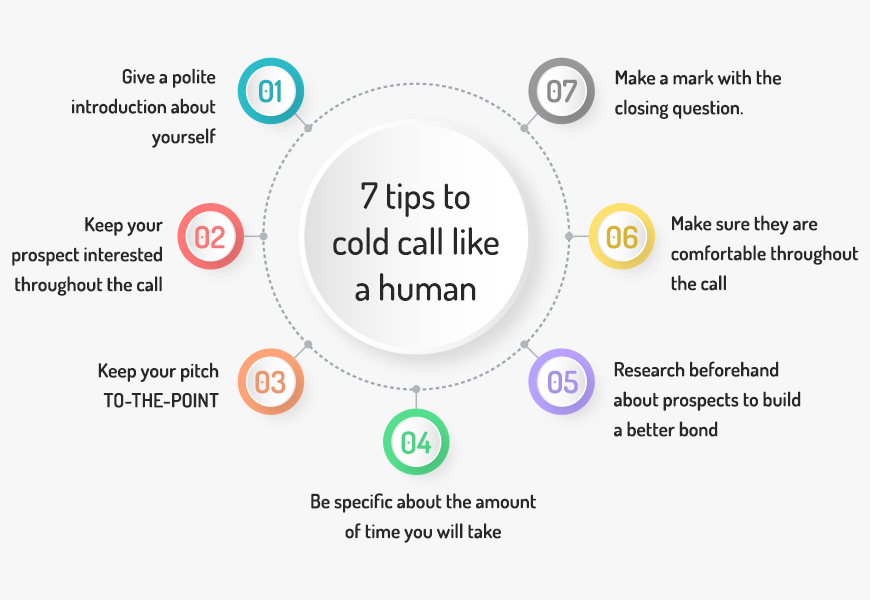I am sure this isn’t the first ‘cold calling tips’ blog you are reading. There are tons and tons of blogs on cold calling tips that appear on your screen when you search for those. But do you realize there is a thin line between being robotic and being a human when you make calls to your sales prospects?
This blog is exactly what you need to read to know how you can be more natural during a call with your prospect.
Cold calling is a sales activity in which sales representatives contact potential customers who have shown no interest in the items or services being provided. The term “cold calling” refers to soliciting a prospect via various channels- phone or in person- without having any prior interaction with the salesman. Cold calling has evolved over the years from a way of providing or rather than reading a sales pitch, into a target-driven sales communication technique.
Cold calling is powerful, but it’s tough. Despite the difficulties for the caller and annoyance for the receiver, cold calling has remained a popular method of generating sales. So, here we have accumulated 7 tips for cold calling for you to be more effective and not sound like a rehearsed person or robot.
Let’s just dive in!

Introduce yourself
What do you usually do when you meet an unknown person? You introduce yourself, of course. And that’s the first rule of cold calling, introduce yourself with your full name and your organization’s name. This is the very first step toward earning your prospect’s respect and earning their trust. This cold calling strategy is especially useful for real estate salespeople who use their name as a brand.
Maintain contact with your prospect
The longer you can keep your prospect on the phone, the more likely you are to have a meeting or get what you’re looking for. Your cold calling script should build up to your major question with each statement or inquiry. A pitch that flows is a cold calling technique for obtaining a meeting. Every sentence should pique your prospect’s interest in what you’ll say next.
Keep it short and simple
After informing them who you are and what you are calling about, offer them a one-sentence explanation of why you are calling.
These three statements should be included when you make a cold call:
- What you have to offer
- Why are you calling this specific person
- What is the call’s purpose
How much time you’ll need
This is a proven psychological trick to put potential customers at ease. Your customers might have had negative encounters with poor salesmen who have kept them on the phone for far longer than they intended, and this time they are ready to make excuses before you take up their entire day.
So in order to avoid this, be specific about how much time you require and try to complete your sales pitch within that time frame.
Research your sales prospects
Before you call your prospects, always research about them through Linkedin, Facebook, or company profiles on the company’s websites, in short, be well prepared and do your homework.
Look for awards they have received and work they have done and published, utilise these things as discussion points during your cold call. You can use their own words to let them realize you are addressing a problem for them after reading what they have written.
Knowing who you are contacting in advance prevents wasting of time for both you and your sales prospects.
Ask for permission if you want to continue
Now that your prospect knows who you are, what you are calling for, and what you are offering. At this point in time, you can’t keep pitching without gaining a deeper understanding of the consumer at this stage. You must ask questions in order to avoid shooting darts in the dark.
When you reach this point, it’s time you ask the question of whether your prospect is interested in what you are offering. And if he is then ask for permission to continue. With this effective method of cold calling, you can keep up the conversation and deliver a persuasive sales pitch that leads to a successful closing.
The closing question should be perfect
Your script is critical to cold calling success, and it will most likely evolve over time as you learn which lines work and which don’t. Learn which portions of your script work well for you and which parts don’t. If your concluding question isn’t eliciting the desired response, consider changing it up over the following several phone conversations. Keep in mind that your ultimate goal should be to schedule the meeting.
The bottom line
Cold calling is a tried and true sales technique for setting up appointments and generating sales. Above are the seven tips and tricks to help you secure meetings and close the deals then and there, also to make you connect with your prospect in a more natural way. I hope you make the best out of it, Happy Cold Calling!

![7 Cold Calling Tips To Trigger Emotions [Unlike A Robot]](https://myoperator.com/blog/wp-content/uploads/2022/01/7-Cold-Calling-Tips-To-Trigger-Emotions-Unlike-A-Robot-V1-1.png)
